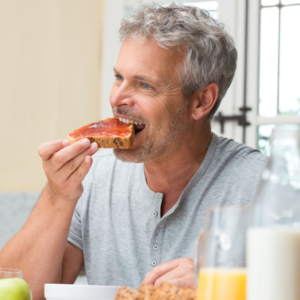Preventing the Spike
By Robin Bush, ISR Communications
There is a lot of talk these days about how to balance your blood sugar levels. Too many Americans have diabetes, pre-diabetes, or struggle with cravings, hunger, or sleepiness after meals caused by blood sugar spikes. Keeping blood sugar levels within a safe range reduces the risk of diabetes and heart disease.
Did you know you can help control blood sugar by diet? There is guidance by biochemist Jessie Inchauspé, author of Glucose Revolution: The Life-Changing Power of Balancing Your Blood Sugar. She recommends eating your meals in a particular order: veggies first, proteins and fats second, starches and sugars last. So, if you are at a restaurant, don’t touch that basket of bread until you first eat some veggies and protein.
She also says that when you eat carbs, adding protein, fat, or fiber is important to reduce the glucose spike. (Try nut butters, avocados, blueberries, and even plain Greek Yogurt). Watch out for fruit puree at the bottom of yogurt or dried fruit in snack bars, and be sure, if you are going to eat rice cakes, you top them with protein. Rice cakes are pure starch that creates large glucose spikes in your bloodstream.
Her most important advice might be this: don’t forget to move. Use your muscles for at least ten minutes within an hour after you finish your meal. Try going for a walk or stand and do the dishes (add a little music and a few dance steps or bend and sway while you scrub those pots and pans. If you need to remain seated, you can add in some upper body moves. Every time a muscle is used, it contracts, and it requires energy to do so. The first place it looks is at the glucose in your bloodstream. It seems everywhere we turn, exercise is one consistent tip provided for better mental and physical health. That frequency tells us something: it’s time to get a move on; you’ll be glad you did.
Looking for more information? There’s a local resource who you might speak with: Glenda Cantrell, email at Glendacantrell@comcast.net. She has personal experience with lowering her blood sugar by diet alone.

